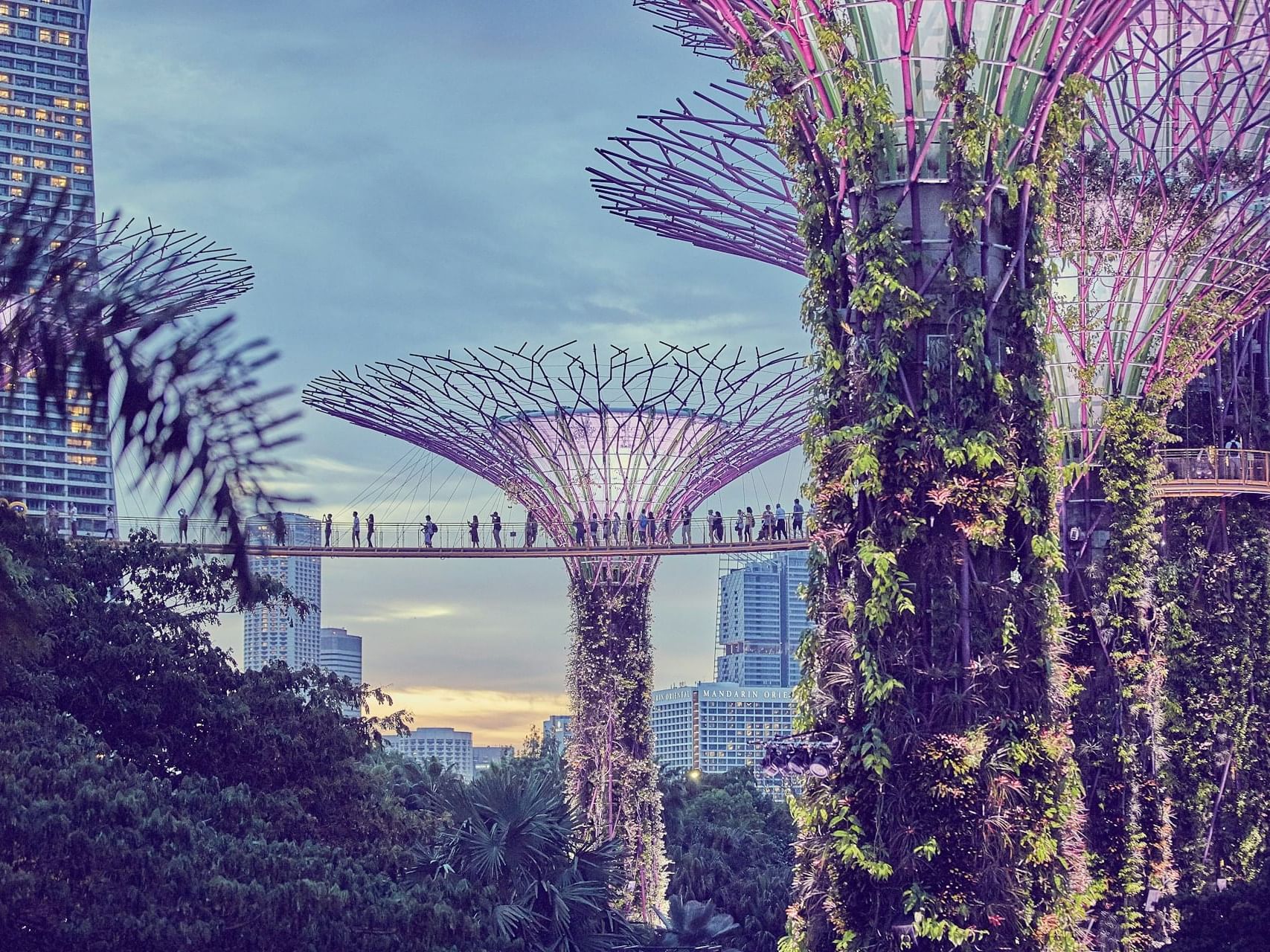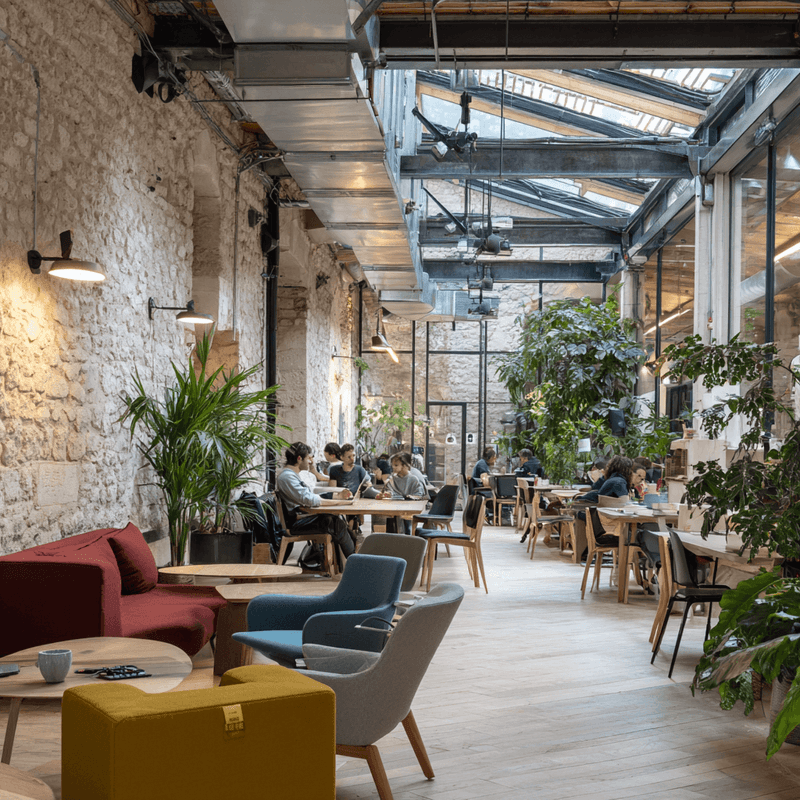
Digitalization, flexibility and innovation. The coworking concept has evolved considerably in recent months, incorporating increasingly sophisticated technologies and innovative tools. The rise of AI has made a major contribution to this development, and is prompting coworking spaces to continue evolving and innovating to adapt to the new demands of the professional world. This transformation, often referred to without exaggeration as "Coworking 8.0", aims to optimize the user experience, improve space management and foster collaboration between members.
An overview of the technologies redefining flexible workspaces: welcome to the flexible workspace era of 2025.
Integrating Artificial Intelligence (AI) and the Internet of Things (IoT) into coworking spaces
AI and IoT play a crucial role in automating and optimizing coworking spaces. IoT sensors, for example, collect real-time data on space occupancy, air quality and environmental conditions... Indicators are increasingly precise and varied. This information can be used to automatically adjust lighting, air conditioning and other parameters to ensure optimum user comfort. It also enables the hyper-personalization of spaces, and can feed into the reporting of each company department.
AI, for its part, analyzes this data to anticipate needs, optimize the use of resources and personalize the experience of each member. In a previous article, we asked Hiptown' s teams about their use of AI and the added value it brings to coworkers.
Reservation management systems and mobile applications
So far, nothing new? Well, think again! Today, online reservation platforms such as workin.space, and mobile applications, make coworking space management much easier. They enable users to reserve offices, meeting rooms or specific equipment in real time. This improves efficiency and flexibility, avoids booking conflicts and maximizes the use of available space, as well as better organizing the day-to-day running of the space. They can, for example, propose specific cleaning schedules based on actual space usage.
Concrete examples illustrate this dynamic. Spaces like The Bureau in Paris or TOG in London integrate automated management technologies and intelligent reservation systems, transforming a simple coworking space into a truly connected ecosystem.
Connected, high-tech coworking spaces
Technological advances are transforming coworking spaces into ultra-connected, interactive environments. The integration of 5G networks, connected objects and cutting-edge management software facilitates day-to-day management and enhances the user experience. These innovations maximize efficiency and anticipate user needs in real time.
Redefining service standards
Some coworking spaces take a fresh approach to the employee experience. The Tech Hub in London, for example, is a veritable catalyst for innovation. This ultra-modern complex combines innovation labs, podcast studios and rapid prototyping spaces, offering entrepreneurs and creators fertile ground to turn their ideas into reality. The emphasis is on inter-company collaboration, with zones dedicated to meetings and networking, powered by artificial intelligence systems capable of analyzing profiles and suggesting relevant connections. This dynamic encourages exchanges between start-ups, SMEs and large corporations, creating an ecosystem where open innovation becomes the norm.
Tech Hub members have access to state-of-the-art 3D printers and virtual reality (VR) equipment, enabling them to design, test and refine their prototypes in real time. Professional podcast studios provide a dedicated space for content creation, enhancing the visibility and impact of projects developed within the hub.
When technology serves nature...
In the heart of Berlin, Digital Oasis pushes back the boundaries of coworking by creating a space where technological innovation and nature blend harmoniously. This avant-garde environment relies on biophilia - the integration of natural elements into design - to offer a soothing and stimulating working environment. Intelligent environmental sensors monitor air quality in real time, automatically adjust brightness and regulate temperature according to the presence and preferences of users.
The plant walls and next-generation air purification system do more than just add an aesthetic touch - they actively participate in creating a healthier indoor climate, reducing stress and promoting concentration. The centerpiece of Digital Oasis, however, remains its augmented reality (AR) meeting rooms, enabling interactive and immersive brainstorming sessions. These connected spaces facilitate collaboration between geographically dispersed teams, by projecting 3D models, dynamic presentations and collaborative tools directly into the participants' physical environment.
These new user-friendly technologies mark the future of flexible workspaces.
-
How can the flexible office reconcile real-estate costs and employee expectations?

05/01/2026 How can the flexible office reconcile real-estate costs and employee expectations?
For decades, the office has been seen as an immutable anchor: an assigned position, a fixed desk, a space designed to accommodate every employee from Monday to Friday, between 9am and 6pm. But this model, long considered indisputable, is now faltering under the impact of profound transformations in the world of work. Massive telecommuting, renewed employee expectations, the search for balance and meaning, and economic pressure on real estate are all forcing organizations to rethink their approach.
-
From cost reduction to cultural transformation: the real challenges of the flexible office

15/12/2025 From cost reduction to cultural transformation: the real challenges of the flexible office
Giving up personal office allocation was no longer seen as an upheaval, but rather as an obvious way of reducing costs, improving real estate efficiency and adapting spaces to contemporary uses. However, the companies that have taken the plunge recognize that the reality far exceeds this initial justification. A genuine cultural transformation was underway!
-
Does coworking restore the value of work?

08/12/2025 Does coworking restore the value of work?
Today, many organizations see Coworking as more than just a real estate service; they see it as a space capable of restoring value to work itself and re-engaging teams. But what exactly is this "value" that coworking claims to restore?